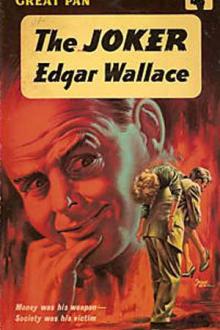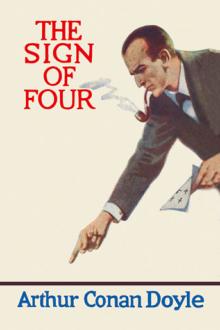The Joker - Edgar Wallace (good book club books TXT) 📗

- Author: Edgar Wallace
- Performer: -
Book online «The Joker - Edgar Wallace (good book club books TXT) 📗». Author Edgar Wallace
called Ingle; and whilst he was there a charwoman had come in and he had
recognised her voice.
‘He was engaged at that time with Ingle in manoeuvring an amazing
swindle. It was none other than the impersonation of the Foreign Minister
by Ingle, who was a brilliant actor. The plot was to get the Minister to
Park Lane, where he would be drugged and his place taken by Ingle, who,
to make himself perfect in the part, had spent a week examining films of
Sir Joseph Layton. In this way he had familiarised himself with Sir
Joseph’s mannerisms; and he had paid one stealthy visit to a public
meeting which Sir Joseph had addressed, in order to study his voice. The
plan worked. Sir Joseph went into a room with Marling, drank a glass of
wine and was immediately knocked out—I think that is the expression.
Ingle waited behind the door all ready made up; and Marling told me he
bore a striking resemblance to the Minister. He went out from the house,
drove to the House of Commons and delivered a war speech which brought
the markets tumbling down.
‘But before this happened there was a tragedy at 704, Park Lane.
Apparently, when Marling approached Ingle the actor-convict had been in
some doubt as to whether he should go to meet him. Ingle at first
suspected a trap and wrote a letter declining to meet. Afterwards he
changed his mind, but left the letter on his writing desk and the
charwoman, Mrs Gibbins, seeing the envelope was marked “Urgent, By Hand,”
came to the conclusion that her master had gone out and forgotten the
letter; and with a desire to oblige, she herself brought it to Park Lane.
Marling opened the door to her and had the shock of his life, for
immediately he recognised her. He invited her into the library and there
she slipped on the parquet floor and fell, cutting her head again the
corner of the desk. They made every effort to restore her: that I can
vouch for. They even brought me down to help, but she was dead, and there
arose the question of disposing of the body.
‘Marling never ceased to blame himself that he did not call in the police
immediately and tell them the truth, but he was afraid to have his name
mentioned in connection with a man who had recently been discharged from
prison; and in the end he and Mrs Edwins took the body to Hyde Park and
dropped it in the water. You tell me there were signs of a struggle, but
that is not so. The footprints were Mrs Edwins’ and not the dead woman’s.
‘Marling never saw the letter which the woman brought, it must have
fallen from her pocket when they were carrying her down the slope towards
the canal. He told me all about it afterwards; and I know he spoke the
truth.’
(Here Mr Harlow’s narrative was interrupted for two hours as he showed
some signs of fatigue. It was resumed at his own request just before
midnight.)
‘Marling regarded his crimes as jokes, and always referred o them as
such. It is, I believe, a common expression amongst the criminal classes
and one which took his fancy. The great “joke” about Sir Joseph was the
plan to restore him to his friends. I think it was partly Ingle’s idea,
and was as follows. Two nigger minstrel suits were procured, exactly
alike, and it was arranged that Ingle, at a certain hour, should get
himself locked up and conveyed to what Marling invariably called “the
lifeboat”—’
‘Lifeboat?’ interrupted Jim quickly. ‘Why did he call it that?’
‘I will tell you,’ resumed Mr Harlow. ‘You will remember that he
presented a police station which he had built only about fifty yards from
this house; he made this presentation with only one idea in his mind: if
he were arrested it was to that police station that he would be taken!
‘Sir Joseph lay under the influence of drugs in the room off the
underground garage until the moment arrived, when he was stripped, his
upper lip shaved and his face covered with the black make-up of a
minstrel. He was then taken through the little door, which you say you
have seen, along a locked passage to one of the stairways beneath the
cells, and the substitution was an easy matter. Every bed in every cell
lilts up, if you know the secret, like the lid of a box; beneath each bed
is a flight of steps leading to the passage and to the garage—’
Jim ran into Evory Street station.
‘I want to sec Harlow quick!’ he said breathlessly.
‘He’s all right; he was asleep the last time I saw him,’ said the
inspector on duty.
‘Let me see him,’ said Jim impatiently; and followed the jailer down the
corridor till they stopped outside Cell No 9.
The jailor squinted through the peep-hole. Suddenly he uttered an
exclamation and turned the lock. The cell was empty!
When they visited the garage, the dark blue car was gone; and though this
was found later abandoned on the Harwich road, the Splendid Harlow had
vanished as though the earth had opened; nor was he ever seen again,
though sometimes there came news from the continent of gigantic
operations engineered through Spanish banks by an unknown plutocrat.
The Splendid Harlow had cached most of his money in Spain, but though Jim
visited that country, he pursued no inquiries. People on their honeymoon
have very little time for criminal investigation.
‘If I had only known about that infernal police station!’ he said once,
as they were loafing through the Puerta del Sol.
Aileen changed the subject at the earliest possible moment.
For she had known about the plank beds which were doors to freedom.
It was too good a joke for Harlow to keep to himself. And in telling her
he ran very little risk. He was an excellent judge of human nature.





Comments (0)